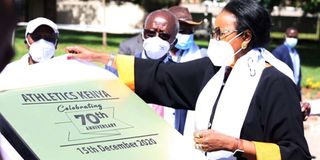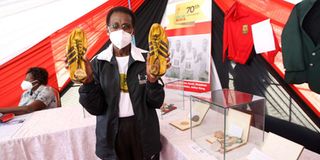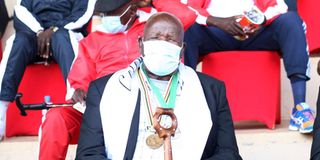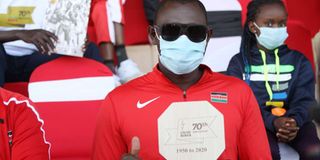Premium
Legends call for clean sport as AK turns 70

Sports Cabinet Secretary Amina Mohammed (right) unveils a plaque in honour of Athletics kenya's 70th anniversary at the Nyayo National Stadium on December 15, 2020.
What you need to know:
- Tata-Muya, the youngest ever Kenyan to compete at the Commonwealth Games (1974), said they never used supplements or went to the gym, but performed well setting national records that are yet to be broken.
- “We consumed natural foods, trained well and respected our coaches,” said Tata-Muya, who still holds the 400m hurdles national record.
Athletics legend celebrated the 70th anniversary since the advent of sport in the country Tuesday with advice to the government and Athletics Kenya (AK) to develop the game across the board and deal with doping menace firmly.
Some of the legends, who numbered 70, expressed concerns that Kenyan athletes, especially women, were not lasting either on track and road running for long, and called on AK to get to the bottom of it.

Sports Cabinet Secretary Amina Mohammed (centre), Sports Chief Administrative Secretary Noor Hassan (right), Athletics Kenya president Jack Tuwei (2nd right),Nyeri Governor Mutahi Kahiga and Eng Ahmed Ibrahim (left) cut a cake in honour of Athletics Kenya's 70th anniversary at the Nyayo National Stadium on December 15, 2020.
The first Kenyan women at the Olympics (1968 Mexico) Lydia Stephens (100m/200m) and Tecla Sang (400m), who spoke passionately on how they competed for fun and enjoyment rather than money, want deliberate efforts made to develop sprints in the country.
The 1988 Olympics gold medallists Julius Kariuki (3,000m steeplechase), John Ngugi (5,000m) and legendary sprinter Rose Tat-Muya said the government and AK must fight doping for the sport to continue existing well.

Lydia Stephens displays the spikes she wore during the 1968 Olympics Games in Mexico. at AK's 70th Anniversary celebrations at the Nyayo stadium on December 15, 2020.
The first Kenyan to win steeplechase title at the Olympics, Amos Biwott, who achieved the feat at the 1968 Summer Games and the Fatwel Kimaiyo, who still holds the 110m hurdles national record set at 1974 Commonwealth Games, also voiced the same concerns.
They advised athletes to use traditional and natural food rather than supplements as Wilson Kiprugut Chumo, the first Kenyan to ever win an Olympic medal during the 1964 Tokyo Summer Games, urged athletes to train hard and put God first.

Kiprugut Chumo follows the proceedings during Athletics Kenya's 70th Anniversary celebrations at Nyayo Stadium on December 15, 2020.
“We need to start the children off at an early age. I started athletics at the age of five when I was at kindergarten in Mombasa,” said the 75-year-old Stephens, adding that she would not have gotten the chance to compete for Kenya if she had not left Mombasa to school elsewhere.
“That is why I want to urge AK and coaches to cast their nets wider. We can produce great sprinters if we are to develop the talent that is rich across the country,” said Stephens.
“We concentrate only in rift valley where there are distance running athletes. The place too has great runners for instance Julius Sang.”

800m record holder David Rudisha display's a plaque during Athletics Kenya's 70th Anniversary celebrations at Nyayo Stadium on December 15, 2020.
Stephens, who was the back-to-back national 100m and 200m champion from 1966 to 1969, explained that Kenya has few sprint coaches, hence AK must strive to train more.
“Our athletes have more opportunities with many events today unlike us who depend only on local and East African Championships.”
Sang, who is a lecturer at Moi University in Eldoret, said AK ought to address and explore the issue of women in athletics.
“Most are not lasting long in athletics. Our women are suffering silently in competitions and nobody is yet to find out why,” said Sang, who advised AK and the government to seek professional help for women athletes.
Tata-Muya, the youngest ever Kenyan to compete at the Commonwealth Games (1974), said they never used supplements or went to the gym, but performed well setting national records that are yet to be broken.
“We consumed natural foods, trained well and respected our coaches,” said Tata-Muya, who still holds the 400m hurdles national record.

Lotto Chief Executive Officer Dr Joan Mwaura (centre) is flanked with John Ngugi (left) and Paul Tergat on during Athletics Kenya's 70th Anniversary celebrations at Nyayo National Stadium on December 15, 2020.
Ngugi and Kariuki noted that the advent of handsome pay in Diamond League meetings and road races is the route of doping.
“We used to train hard and fight easy, but money is making athletes lose focus,” said Ngugi, the five-time world cross country champion.
“We lasted long because we used natural ways of eating and training. Yes, we need to embrace technology but not the extent of using shortcuts to win. Let athletes win clean money so as to preserve the sport,” said Kariuki.





